Which mods are legal and which are illegal?
"Find out which mods are road legal and which would land you in hot water."
A lot of people ask us if mods are legal or not, and it certainly depends on where you live, but in this article we're going to look at 10 common mods that are illegal pretty much everywhere you go.
Whether a mod is legal or not depends very much on where you live. Just as beauty is in the eye of the beholder, the legality of mods are subject to interpretation of the law.
Thankfully in many areas the law is clear, but in others there is some scope for discussion and debate, hence the confusion and common urban myths around mods and their legality.
Every country seems to have a completely separate list of laws, but there are some principles that apply to most areas in most regions, and just by following those sets of principles, you can avoid a lot of the problems with legality.
One of the frustrating things is there's a wide area of interpretation with regards to the law, and here in the UK, like most areas, we have an annual road worthiness test.
We call it the MOT test, and the guidelines that are given to mot testers vary from those that are given to the police when they come to stop and check a vehicle.
It may be a case that your vehicle passes an mot but would fail a police spot check.
We need to just flag up some of these areas and just make sure that we stay on the right side of keeping our cars legal.
You can watch our video version of this article on illegal car mods our YouTube channel.
10 Illegal car mods
Here are the 10 most common illegal mods for most areas, regions and states, although local laws may differ these are generally the typical things to look out for.
- Sun visors - how big can they be?
- Lights on vehicles - are undercar Neons legal, what about blue or colored bulbs?
- Window Tinting - how much tint can we have?
- Loud Exhaust - & Cat DPF removal - is it legal to remove a DPF or catalyst from your car?
- Removal of safety equipment - air bags, seatbelts etc..
- Nitrous kits - Are nitrous kits legal to use them on the road?
- Wheels, stretches and camber - What is the law?
- Emissions regulations - what is the law about car emissions?
- Fitting non approved parts - what parts can you legally fit to your car?
- Invalid car insurance - common mistakes that cause invalidated insurance.
#1 Sun Visors
One example of that is having a sun visor at the top of the screen.
The mot tester will generally speaking just check that it doesn't obscure the driver's view of the road ahead, and if it doesn't, he will give the car a pass.
But if a policeman were to examine the same car, he would be working to a rule that states that the visor at the top of the screen must not extend into the sweep of the wiper blades by more than one centimeter.
The obvious shortcut to that is to shorten your wiper blades, but that just flags up the minefield that we're opening up here.
Mods that are technically legal depends who you talk to. An MOT tester or to the police that are involved will be working to different guidelines.
Sometimes people have been stopped by the police, ticketed and sebsequently taken the offence to court for appeal and have had the judgement passed in their favor. In these cases the application of the law at the discretion of the particular policeman was considered too extreme for the circumstances.
#2 Vehicle lights & the Law
The first obvious mod that we would certainly want to flag up is the use of lights on the vehicle.
In most countries, you need to have only red lights at the rear of the vehicle other than the reversing lights/signals and no blue lights or additional flashing lights or otherwise distracting lights anywhere else on the vehicle.
That would rule out brightly coloured undercar neons in most regions and areas. Although in some areas you may show a red undercar light to the rear only, and white undercar lights to the front only - providing this doesn't dazzle or distract other road users.
It's fine to fit these things for show use. If you drive on the road, you are likely to get pulled over and stopped and given some sort of ticket or citation in most areas.
Be careful with your choice of lights. It will draw attention to your car from law enforcement, and you could end up becoming subject to a very thorough vehicle inspection.
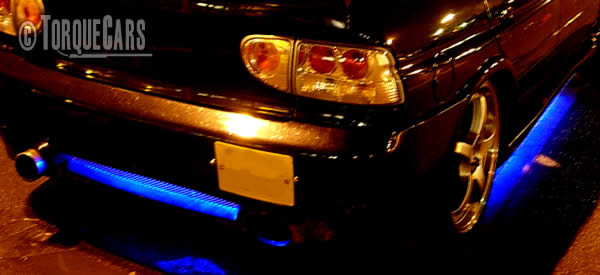
You certainly don't want to have any different coloured bulbs in the front of your car in most regions and areas. (Although HID lights give a tinge of purple, this is still within the permitted light output range and the effect is only visible at certain angles.)
I think we've all, at some point, maybe put a blue bulb in there or a different coloured bulb just to be different.
I've certainly had them pulled out during the mot test and replaced with standard bulbs, which was frustrating because it cost me a bit of money, but there you go, that's life.
It kept the car legal and if someone had told me in advance that I couldn't really do that then it would have saved me wasting that money.
Here you go. Here's the advice for free.
#3 Regulations about window tinting
Another common area that people often fall down in is window tinting.
Applying a tint to your car windows can actually cause a lot of problems if you've not followed the regulations.
Check what the regulations are. The cars look quite cool when they've got blacked-out windows but again this will draw attention to your vehicle if it is too heavy.
There are practicalities as well, especially in the summer, when the temperature inside the car can get quite hot. If you've got a fairly heavy tint, it can reduce that thermal transfer to the inside of the car and help keep things cool
In most areas, and certainly in the UK, there are very strict limits on the amount of light that must be transmitted through the glass, and it is usually about 75 percent of light transmission is required at the front of the car.
This can vary depending on the age of the car in the UK with older cars having slightly lower light transmission requirements.
Bear in mind that your stock windows may well have a light tint on them, so adding a 75% film to them will put you outside of the limits.
You can usually go with a slightly darker tint to the rear of the car and on the back windows, but in most regions, most states, and most countries, you've got to be very careful with how far you go with your window tinting anywhere in the drivers direct line of sight.
A lot of these diy kits don't actually stipulate the amount of light transmission and those that do are not always very accurate.
On a roadside check they will measure the amount of light that comes through and if you fail, you can find yourself with fines, get your car impounded, and have all sorts of legal problems and issues.
It's best avoided by buying a legal tint in the first place. Check before you do a mod in your area just to make sure it's legal and you'll avoid a lot of these pitfalls and problems.
#4 Exhaust Mods which are Illegal
Another fairly common mod is the exhaust. But there are some common pitfalls here.
People put higher flowing sports exhaust on and that normally comes with an increase in noise.
In most areas, if you've adjusted the output of noise of the vehicle from what was originally approved on that car, you can fall foul of the law.
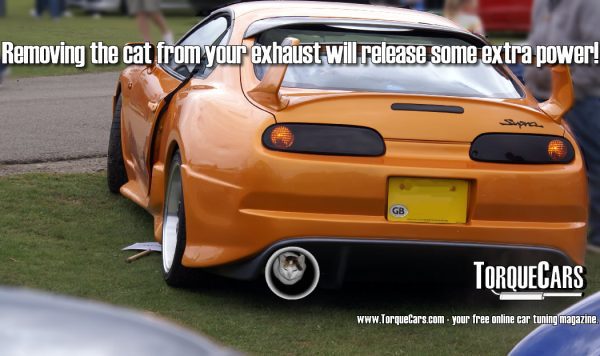
Here in the UK, there are fairly strict decibel limits that vehicles can emit.
But the guiding principle is if the car is louder than it would be with the OEM factory exhaust. A deeper tone is not necessarily louder!
It depends on the age of the vehicle, but if your sports exhaust is making too much noise or can be considered a nuisance to others in the neighbourhood and on the roads, then you can find yourself on the wrong end of the law, even if it technically meets the above requirements.
Decat, catalysts removal, and DPF deletes
Be careful when it comes to modifying your exhaust, and while we're talking about exhausts, we should also talk about the removal of catalysts.
The catalyst does a lot of work in cleaning up the emissions of the car and keeping you on the right side of those emissions regulations that have been stipulated for your country.
Whether that's measured in CO2 particles or some other gas emission, whatever it is in your area, you need to make sure that your vehicle still meets those emissions.
You might even get away with some cars by removing the catalyst or the dpf and still meeting those emissions requirements, but if that's the case, there may well still be a law that states you cannot remove these pollution control systems from your car.
If you've taken off something that was originally designed to be on the car to reduce emissions, you can certainly find yourselves on the wrong end of the law. Be careful with that one.
There are many exceptions and there are many fine details out there and this is very variable depending on your region. It's very easy to find yourself on the wrong side of the law.
Things change, and I know in the UK you could get away with dpf removals, but that's no longer the case; it's been tightened up, and I believe what was more of a general regulation or guideline has been solidified and is now in black and white.
The complete removal of DPS from your car is a no-no, but in most cases, you can replace those DPF'S with higher flowing sports alternatives that provide exactly the same power gains as removing it completely so there are other options, but that's not available in some countries.
I know that in some states and some countries you can't even replace catalysts or dpfs on a vehicle if they're in working order.
You're only allowed to do it once they've failed and with approved aftermarket parts.
#5 Is Nitrous Legal to use?
Nitrous oxide is an additional fuel that's pumped into the engine and it substantially adds power.
You get a short burst of an extra 25 to 60 horsepower just at the flick of a switch.
You can see the appeal as to why people would do this mod, but in most areas it's illegal to use nitrous oxide on the roads.
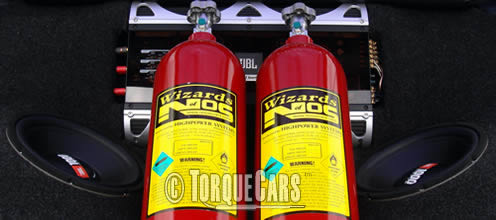
If you were doing drag races and you're doing off-road use of your car, then it's certainly a good idea to get nitrous and just max your power out and take your car to that absolute limit, but on everyday roads in most areas you won't get away with even having it in the car.
In some countries you can carry nitrous bottles and nitrous kits, and in others you need to display warnings on the car.
In some regions you cannot carry these explosive gases in your vehicle at all.
#6 Removal of safety devices
Again, check your local guidelines and your local regulations because it does vary when a car is sold, it's tested for safety and often the removal of those safety devices would make the car illegal.
Replacing the steering wheel seems like a good idea. Back in the 80s, that's what everyone used to do to their cars.
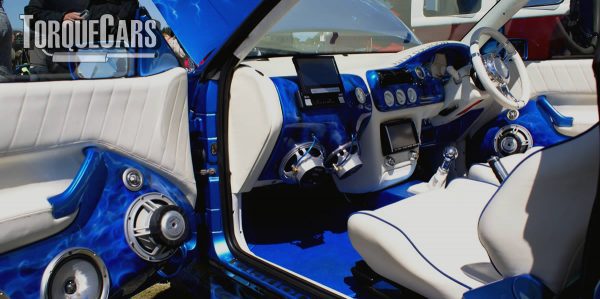
They'd fit the rally steering wheels with the nice grips and just go for the styling benefits, but that nowadays would usually necessitate removal of the airbag.
If your car came with an airbag, to keep that car legal on the road in most areas, you need to have an airbag that's fitted and the same applies to race harnesses and seat belts and other internal safety devices.
You need to keep the car as it was originally approved in most areas. This can mean sticking to the stock seats, and dashboard and door cards which have all been safety tested and approved.
If you're in an area that's a bit more flexible, then that's good if you plan to take your interior to the next level. Don't expect the law to remain flexible though, in my experience things are always tightening up.
#7 Meeting emissions regulations
If a mod or upgrade will effect the emissions of your vehicle and takes it outside of what the car was approved with, you can run foul of the law.
As a tuner, you want to make the car as efficient as possible. You want to use the fuel as effectively as possible.
And usually, if it's not burning correctly or it's running too rich, you're not getting the maximum amount of power from your fuel.
So a well tuned car should theoretically be emitting cleaner emissions, but it will be consuming more fuel as you've increased the power, and this will have a bearing on the emissions output when measured at the roadside.
It obviously depends a lot on the engine and the setup, but just keeping the car running as efficiently and cleanly as possible makes a lot of sense as a driver and for performance benefits.
#8 Dangerous Tire and wheel mods
Another area to be very careful about is tires (tyres for our UK readers!)
There's a misconception that all you need to do is make sure that the top part of the tread is inside the frame of the car.
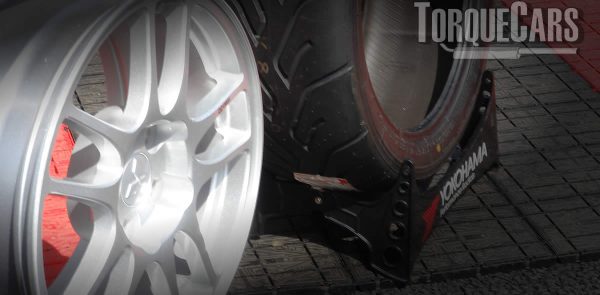
However, if you've got bits of the wheel sticking out or fitted stretched tyres where only the tread is in but the bulk of the aloe wheel is outside the body work of the car, that's going to draw a lot of attention to your car and you're probably going to hit legal problems in most areas.
looking at a car from behind or in front, if it's got things sticking out that could injure a pedestrian if there was a crash or an impact, then you won't get away with it.
Most law enforcement officials will pull you over and give you some kind of citation or warning because of that.
It also applies to sticking wings and spoilers on the car.
If they could cause injury to other people, there's a big argument that they are illegal and you need to get them addressed.
Think very carefully about the car and its structure, and make sure there are no bits of the wheels sticking out further than the body of the car.
#9 Always fit tested and approved parts to your car
Fitting non-approved parts to your car is another issue to watch for. Many parts sold are marked "off-road use only". If you see that on the boxes you think you're buying something that's set up for the competition or sports use. Actually, in most cases, they just haven't bothered getting it tested for road use.
It may be made using defective materials or it may not be made to high safety standards.
Metal parts may crack and fail when put under the stress of everyday use.
In most countries, you can only fit parts to your car if they have been approved and safety tested. It makes sense.
You don't want to be putting dangerous parts on your car and don't ever make the mistake that just because a part is labelled for competition motorsport use that it's going to offer some benefits, because often it's just a manufacturer cutting corners.
They've not bothered to get it properly checked and type approved.
Don't fall foul of the law just because you've cheaped out and bought dubious parts from a dubious parts supplier and then fitted them to your car. They don't generally care what they're selling.
I know that in some areas, the law is catching up with a lot of people who are selling dangerous parts or making modifications to cars that would make them illegal.
These companies are being issues with fines, or have to remove the products they sell, or reduce the power they add to meet emissions regulations.
So expect to see more of that and it's going to get harder and harder to modify cars in most areas, but that's a bit of a shame really, because a lot of the real car enthusiasts are making the cars better and improving on what the original manufacturer had designed and set the car up for.
You're making the cars safer and more enjoyable to drive if you do it right, and this is what car customization is all about in my book.
#10 Keeping your insurance valid and legal
The final thing that we need to flagger is to notify your insurers.
When you fill in your insurance form, certainly in the UK and in most areas, it asks you if your car is modified.
See our video which covers all the principles of How Insurance Works and may help you save money by learning some insider secrets. Be sure to keep up with our latest YouTube content and subscribe.
It frustrates me that when you fill in a clean form it doesn't just say is your car modified, it'll often say is your car modified, specially adapted, had non-standard parts fitted or modified in any way, shape or form.
They're asking a much more specific question when you put your claim on me.
If you answer yes, at that point, they're going to throw the claim out.
The insurance companies do not like paying out money, so they will use any excuse they can to get out of dealing with the claim and making a payment, and that can actually leave you without insurance.
It can leave you liable to prosecution for driving without insurance, and if you've had an accident and done damage to other cars or other people, you can be held personally liable for the costs incurred as a result of your accident because you've not got the benefit of the insurance.
Be very careful, it doesn't actually make sense to modify your car and not tell your insurers.
If you go to a specialist car insurer, you'll generally find preferable rates.
The way insurance works is that they look at the number of claims that people submit and they try and predict how much likelihood there is of each person making a claim, and they divide the cost of these claims plus a bit of profit and their costs among all of the policyholders.
Each person bears a proportion of the risk for themselves and for others. If you're a particularly careless driver, the careful drivers are paying for you.
In order to make it fair, the insurers are drilling down and looking at very specific details of each person.
You're much more likely to be paying a premium that is proportional to the risk that you're actually presenting.
If you go to a specialist insurer, you'll actually find that a lot of those are filled with owners that are very careful with their cars.
They've modified their cars, they've adapted them, they've spent time and money on the cars, and the last thing they're going to do is drive recklessly or have an accident.
They will often offer better premiums. It's always worth asking the question rather than finding out when you make a claim.
If you're planning to modify your car, go to your existing insurer and just ask them.
Will it affect your premium? Chances are it probably will because you've not gone to them in the first place for a modified quote and may be outside of their "normal".
A lot of companies are quite flexible with the common mods that people do, but some of the higher powered increases that you get through other mods may require special considerations.
Adding different brake pads, air filters and service items are generally ignored in most cases as long as they perform as well as the OEM parts they replace.
We've also seen insurers happy when performance parts from one model are fitted to a more basic version of the same model.
Always go to a specialist modified car insurer and get a quote from them for the parts and you'll know that your car is properly covered. You can't claim "my mate said" or "I didn't think it would matter" as your defence.
Also bear in mind that many performance parts can cost more, and if you have an accident, you will get the money back to replace the performance parts you fitted, not just standard ones.
You certainly won't find yourself in that situation where your insurance is invalid and you're stuck dealing with a claim yourself and facing prosecution for driving a car without insurance on the roads.
Keep it safe, stay legal, and get involved in our discussions below, in our forum and on our YouTube channel.
Please Check out my YouTube channel, we're regularly adding new content...
PLEASE HELP: I NEED YOUR DONATIONS TO COVER THE COSTS OF RUNNING THIS SITE AND KEEP IT RUNNING. I do not charge you to access this website and it saves most TorqueCars readers $100's each year - but we are NON PROFIT and not even covering our costs. To keep us running PLEASE Donate here
If you liked this page please share it with your friends, drop a link to it in your favourite forum or use the bookmarking options to save it to your social media profile.
Feedback - What do You Think?
Please use our forums if you wish to ask a tuning question, and please note we do not sell parts or services, we are just an online magazine.
Help us improve, leave a suggestion or tip
Please watch this video and subscribe to my YouTube channel.

 Click to accept YouTube Cookies & Play.
Click to accept YouTube Cookies & Play.